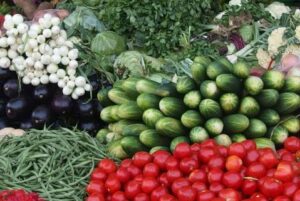Government urged to design agricultural policies for specific vegetables
 The Agency for Health and Food Security has called on government to as a matter of urgency, design agricultural policies for specific vegetables to ensure efficient value chain management and production of safe foods.
The Agency for Health and Food Security has called on government to as a matter of urgency, design agricultural policies for specific vegetables to ensure efficient value chain management and production of safe foods.
The recommendation followed findings obtained from a research conducted by the Agency on vegetables with an aim of strengthening the Agricultural Value chain for sustainable development.
The research studied 120 participants including farmers, individuals from financial institutions and agro-import dealers from Kumasi, Sunyani and the Northern part of the country through a focused group discussion.
Mr Kwaku Asante, the Director of the Agency explained that even though the country has policies for some commodities like cocoa, cereals and legumes, it has none for the vegetable sector, which affected the entire vegetable value-chain from the nursery stage to the harvest and distribution stage.
He said due to that, a lot of challenges are faced in the sector, which led to the importation of basic kinds of vegetables from other countries.
“Burkina Faso has less rainfall than us, but Ghana imports almost all its tomatoes and onions from them. So what is preventing us from producing the quantity that we need? That is a question we need to think about,” he said.
Some challenges identified during the research, he said, were the delay in delivery of inputs by the government, a situation he said, sometimes made the inputs useless to the farmers as they got it at a wrong season.
Mr Asante said per the research, only about 10 per cent of the farmers studied were professionally trained to carry out any agricultural activity, therefore, most of them resorted to learning the practices of other unprofessional farmers to manage their farms.
“Most of them have no knowledge on the exact type and quantity of seeds, fertilizers, pesticides and weedicides to use for their crops, and that sometimes destroy the crops and make them unsafe for consumption,” he said.
The research also found out that farmers have to engage in conflicts over their farm lands, because Chiefs sometimes sold their farms to people who offered to re-purchase it with huge sums of money for their personal projects.
Meanwhile, Ghanaian vegetable consumption, he said, increased by 10 per cent every year, contributing to about 250 million dollars revenue per annum for the country and it therefore needs boosting.
The Director said research had also shown that 820 million people suffered from hunger and malnutrition globally and Africa constituted 30 per cent, which was about 246 million people as a result of lack or poor consumption of vegetables.
“Four out of every 10 fertile women in Ghana between the ages of 15 and 49 suffer from anaemia and six out of every 10 children under age five suffer from anaemia,” he said.
He suggested that the huge sums of money used to import vegetables should be invested into the Agricultural sector to make it attractive for the youth to manage.
Mr Asante recommended that project implementing partners and farmers be given intensive education and training on how to use inputs and manager their farms.
He said it would be necessary for stakeholder consultations prior to agricultural value chain policy designs to include interdisciplinary mix of experts from universities, research institutions and civil society organisations as well as the private sector actors engaged in agriculture.
“There should be specific projects and investments strategies to deal with vegetable value chain challenges,” he added.
Source: GNA
